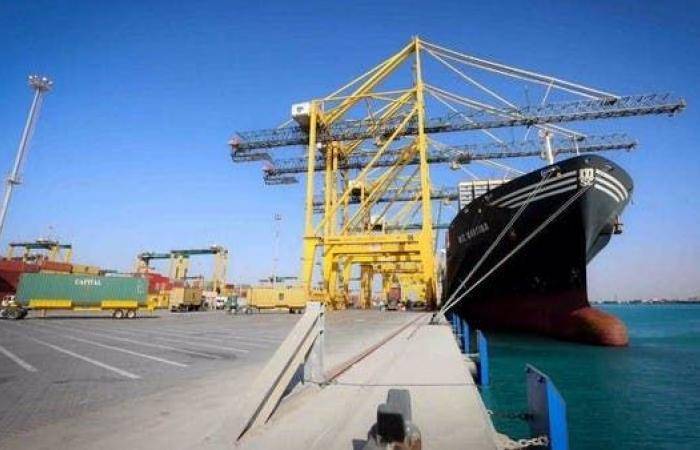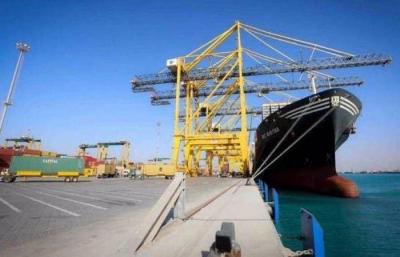The Arab News Agencies Union (FANA) circulated a report from the Saudi Press Agency (SPA), prepared by Khaled Al-Amoudi, about Saudi ports as part of the union's monthly economic bulletin.
Saudi Arabia is distinguished by its strategic geographic location, overlooking the Arabian Gulf and the Red Sea, serving as a major gateway and link between three continents: Asia, Europe, and Africa. It is a key transit hub for trade routes on land, air, and sea, which has been leveraged in the Saudi Vision 2030, focusing on diversifying the non-oil economy through the launch of pioneering programs and goals to make the kingdom a global logistics hub.
The Kingdom has launched the National Transport and Logistics Strategy—one of the main pillars of Vision 2030—which enhances human and technical capacities in the transport and logistics sector, strengthens ties with the global economy, and enables the country to utilize its geographic centrality among the three continents to diversify its economy by establishing an advanced logistics services industry, developing high-quality service systems, and applying competitive business models to enhance productivity and sustainability in the logistics sector as a primary focus in the Kingdom's plans and as a vital enabler for economic sectors.
The National Transport and Logistics Strategy includes a wide range of major projects and developmental initiatives that will elevate transport services and the logistics industry to advanced regional and international levels to support sustainable development across the regions of the Kingdom.
This strategy aims to position Saudi Arabia as a global center for transport and logistics by creating global logistics platforms and zones, developing port infrastructure, expanding their capacity, and improving operational efficiency. It also aims to increase the contribution of the transport and logistics sector to the national GDP from 6% to 10% and achieve several goals, notably being among the top ten countries globally in the logistics performance index, advancing in the cross-border trade index to be among the top 35 countries globally, being among the top six countries globally in road quality indicators while maintaining global leadership in road network connectivity, and shipping over 4.5 million tons by air annually, in addition to increasing destinations to over 250 international locations.
In line with the National Transport and Logistics Strategy, the Saudi Ports Authority ("Mawani") is leading the transformation in maritime transport and logistics services. It has approved its new corporate strategy, aimed at developing a sustainable and prosperous maritime sector and enhancing trade and economic development in the Kingdom.
Saudi Arabia has 13 ports on the Red Sea and the Arabian Gulf, including Jeddah Islamic Port, King Abdulaziz Port, King Abdullah Port, King Fahd Industrial Port in Jubail, Yanbu Commercial Port, King Fahd Industrial Port in Yanbu, Jubail Commercial Port, Jazan Port, Duba Port, Ras Al Khair Port, Ras Tanura Port, Khafji Port, and Jazan Port for Basic and Transformative Industries. These ports account for 13% of the global trade volume and facilitate 70% of the Kingdom's imports and 95% of its exports, with 291 berths and a capacity estimated at 1.1 billion tons and 20 million containers.
According to data from the General Authority for Statistics, the value of non-oil exports from Saudi Arabia in 2021 reached 187,950,268,805 Riyals, while the value of imports reached 343,665,939,711 Riyals in the same year.
Saudi ports are gateways for trade and development among the three continents—Asia, Europe, and Africa—as they keep pace with the rapid changes in maritime trade. They have adapted to the swift advances in the maritime transport and logistics industries by upgrading infrastructure to accommodate new generations of vessels. For example, King Abdulaziz Port welcomed the vessel "COSCO Solar," with a capacity of 21,300 containers and dimensions of 400 meters in length and 59 meters in width. Additionally, Jeddah Islamic Port received the first and largest container ship in the world operating entirely on environmentally friendly liquefied natural gas (LNG), with a capacity of 23,000 standard containers and dimensions of 400 meters in length and 61 meters in width. These initiatives have led to significant improvements in the operational efficiency of ports and significant investments that have resulted in consecutive updates of equipment and facilities, achieving higher service levels for customers and beneficiaries per the highest international standards.
Omar bin Talal Hariri, the President of the Saudi Ports Authority, stated in a conversation with the Saudi Press Agency that "Mawani" has approved its new corporate strategy to support the Kingdom's trade and economic development. He pointed out that the status and attractiveness of Saudi ports placed the Kingdom fifth globally in handling container ships, according to the annual (UNCTAD) index for 2020 issued by the United Nations Conference on Trade and Development. The Kingdom also advanced in the maritime navigation network connectivity index, achieving a score of 70.68 points in the (UNCTAD) report for the third quarter of 2021, becoming the highest mover regionally in that index as part of the country's efforts to enhance its competitiveness and international presence in the maritime transport sector.
Hariri outlined several significant achievements made by "Mawani" in recent times, including signing numerous agreements to develop a prosperous and sustainable maritime transport system that supports the Kingdom's economic and social ambitions and aligns with the goals of Vision 2030. The first phase of the southern container terminal development project at Jeddah Islamic Port was launched, part of a total investment from DP World amounting to 3 billion Riyals. Additionally, seven new shipping services were added through Jeddah Islamic Port and King Abdulaziz Port in Dammam, connecting to ports in the Indian Ocean, Northern Europe, Djibouti, China, and Bahrain. A commercial agreement was signed with the global shipping line "Hapag-Lloyd" to increase container volumes in Saudi ports.
The international classification of the performance of Saudi ports rose to the 16th place in terms of handling volume according to the annual report from (Lloyd's List). Three Saudi ports were ranked among the top 100 ports globally: Jeddah Islamic Port ranked 37th, King Abdullah Port ranked 84th, and King Abdulaziz Port ranked 93rd. "Mawani" signed exceptional agreements with prominent companies in the maritime transport and logistics sector, expecting more than 1.2 billion Riyals in investments for logistics infrastructure. These agreements include establishing the largest integrated logistics services area in the Middle East at Jeddah Islamic Port with foreign investments exceeding 500 million Riyals from Maersk, and another agreement with CMA CGM Group to create a logistics platform valued at approximately 487 million Riyals and covering over 130,000 square meters.
"Mawani" entered into contracts to establish the fifth and sixth warehouses at Jeddah Islamic Port in collaboration with a strategic partner, "LogiPoint," part of the Cisco Group, totaling more than 43,000 square meters and with an investment value of 150 million Riyals. Additionally, an agreement was signed with the Saudi National Shipping Company ("Bahri") to create a logistics area within Jeddah Islamic Port for building warehouses to store and handle all types of goods and containers. A contract was also awarded to create the largest grain and feed import and processing station in the Middle East, containing 120 silos and a grain handling station with a capacity exceeding 8 million tons.
Thanks to the unwavering support from the wise leadership – may God protect it – the volume of handled cargo increased by 7.18% during the first quarter of 2022, totaling over 74 million tons. The number of container shipments rose by 5.91%, totaling approximately 1.3 million standard containers, compared to the same period in 2021. Saudi ports also saw growth in several other operational indicators, including a 12.85% increase in the number of vehicles, totaling around 219,488 vehicles, a 61.70% rise in passenger numbers, totaling 258,076 passengers, and a 0.28% increase in the number of ships, totaling 3,186 vessels.
In alignment with "Mawani’s" strategic goals aimed at maximizing the extensive capacity of Saudi ports, 32 projects have been carried out to develop port infrastructure, including construction and improvement of berths and deepening turning basins, along with providing investment opportunities to develop and operate terminals in Saudi ports, contributing to adding value to the national economy and supporting the investment climate and commercial movement in the Kingdom.
To enhance user experience and port client services, "Mawani" developed seven modern systems and granted 16 licenses to local and international shipping agents. This included activating the truck appointment booking system at Jeddah Islamic Port and King Abdulaziz Port in Dammam, which is expected to reduce the average truck turnaround time from 6 hours to 25 minutes and extend working hours from 8 hours to 24 hours, in addition to reducing paperwork procedures from at least six documents to one.
In efforts to empower and support the growth of the tourism and sports sectors in the Kingdom, the Saudi Ports Authority is partnering with the Public Investment Fund to implement several marine logistics infrastructure projects to develop the cruise ship sector in the Kingdom. Recently, an agreement was signed with "Saudi Cruise" and the global marine services company "Glob" to create and develop passenger lounges and cruise ship berths at Saudi ports, contributing to making the Kingdom a leader in the cruise industry. Additionally, "Mawani" launched the first cruise terminal in Jeddah Islamic Port, starting its operations, and further supported the sports sector through the reception of equipment and machinery related to these recreational and sports activities taking place in the Kingdom.




